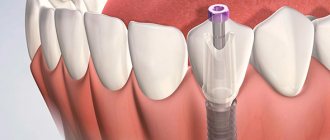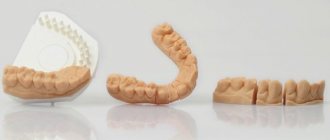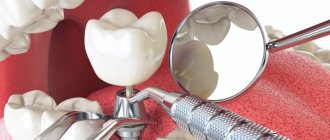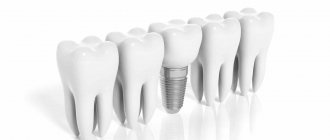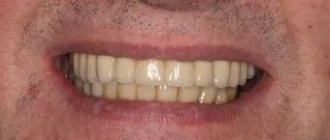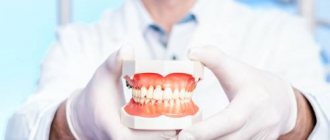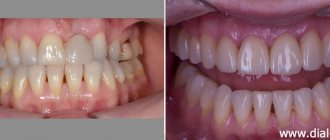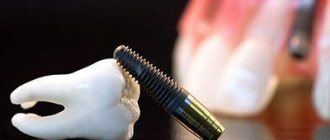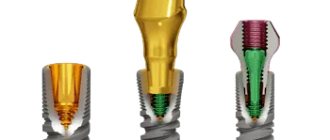Keeping your teeth and gums healthy for many years is easy if you approach this issue responsibly. It is necessary to visit a dental clinic regularly, even in the absence of complaints: preventative visits will prevent diseases or diagnose them at an early stage, which significantly simplifies treatment.
If you have chronic diseases or artificial structures (crowns, bridges, braces, etc.), the doctor can create an individual visit schedule. More frequent visits will also be required if there is a high risk of developing certain diseases, for example during pregnancy and after childbirth.
When is prosthetics indicated?
Installing a crown on a tooth is a necessary procedure in situations where the patient:
- the tooth is destroyed as a result of injury, abrasion of enamel or carious lesions,
- extensions, fillings and other treatment methods are not possible,
- the root remained intact.
Some defects, including discoloration of the enamel, lead to an unaesthetic appearance of the entire dentition. The crown will protect the tooth walls from external impacts. Tooth mobility is caused by various periodontal pathologies. In this case, the use of temporary crowns is considered, which make it possible to strengthen the teeth and make them more stable. Crowns are also placed on healthy teeth, which act as support for defects associated with the installation of bridges and dentures.
What dental services are most in demand?
Types of dental services include methods of prevention and treatment of teeth, jaws and oral cavity. The progress of treatment depends entirely on the qualifications of the dentist and the quality of materials. List of dental services:
Diagnostics
In dentistry, it is important to recognize the beginning of the inflammatory process in time.
Thanks to timely diagnosis, more serious problems can be avoided. It is better to cure caries in time than to then install a denture. Regular visits to the dentist help save time and save money. More details
Dental treatment
We provide therapeutic dentistry services and treat carious diseases.
Non-carious dental lesions include various enamel pathologies due to demineralization (lack of calcium), excess fluoride, necrosis, erosion, and jaw injuries. But more often, clients experience caries and its complications, for example, pulpitis. More details
Gum treatment
Periodontics deals with the treatment of the tissues surrounding the tooth.
There are both fairly harmless diseases like stomatitis and serious periodontal pathologies that can lead to tooth loss if therapy is not started in time. Bleeding, looseness and redness of the gums are a reason to contact a periodontist. More details
Dental implantation
Installing an implant in place of a damaged tooth is extremely important not only from an aesthetic point of view, but also for restoring physiological functions.
A titanium alloy dental implant replaces the tooth root. At the site of the extracted tooth, the tissue becomes thinner, the dentition may “lead,” which will negatively affect the appearance. If molars are missing, the load falls on the premolars, incisors and canines, and this leads to premature thinning of the tissue. In addition, the lack of normal chewing of food negatively affects digestion. More details
Prosthetics
We can install removable or fixed dentures.
Depending on the condition of the teeth, we install bridges, lumires, dentures, veneers, crowns, including full and partial, permanent and temporary. More details
Tooth extraction
The indication for removal is severe destruction of the crown.
There are situations when it seems that the tooth cannot be saved. Our doctors try to the last to preserve the remains of the tooth using fillings and extensions. Wisdom teeth that prevent the jaws from closing normally are often removed. The removal procedure in our clinic is painless. In difficult cases, we use general anesthesia, so the patient will not feel anything. After the procedure, we give recommendations on how to properly care for the socket and prepare for implantation. More details
Aesthetic dentistry
A beautiful smile significantly improves self-esteem.
With us you can correct your bite, straighten your teeth at any age without braces, remove tartar and plaque, whiten the enamel, and also correct the shape of your teeth using artistic restoration. More details
At the intersection of aesthetic and preventive dentistry is professional oral care. Hygiene is carried out once every 6 months. Thanks to this service, you can restore the shine of enamel, as well as stop the growth of cariogenic bacteria and avoid caries, because preventing a disease is easier than curing it. So don't forget to visit your hygienist.
Types of Dental Crowns
There are different options depending on the raw material from which they are made. Each of them has its pros and cons.
Metal
Classic dentures in dentistry. Currently, inexpensive alloys made from medical steel, which is not subject to oxidation and is a durable, wear-resistant material, are often used for the manufacture of orthopedic structures. Disadvantages include an unaesthetic appearance and the risk of allergic reactions. Such dentures are installed on chewing teeth, which are not visible when a person talks or smiles.
Metal ceramics
Such crowns are durable and aesthetically attractive. In addition, their cost is significantly lower than all-ceramic analogues. The disadvantages of this type of prosthetics is that it is impossible to achieve the effect of transparency of the cutting edges in the prosthetic group of the anterior teeth.
Ceramics
The most attractive and expensive option. All-ceramic dentures are made from porcelain processed on a special milling machine. They are very similar to natural teeth. However, ceramics are fragile and cannot withstand significant chewing loads. Therefore, dentures made from it are used to restore front teeth.
Zirconium dioxide
It is not inferior in strength to natural tooth enamel. The material is suitable for the manufacture of solid bridges. The shade of zirconium dioxide can be matched exactly to the color of the patient’s natural teeth. The crowns are completely biologically compatible and safe for human health. They are suitable for patients with metal allergies.
Glass ceramics e.max
The most modern denture technology. The structure of the material is closest to tooth enamel. Externally, crowns are indistinguishable from natural teeth. Glass ceramics are biologically inert and hypoallergenic, while they are impervious to dyes and odors.
How is a crown placed on a tooth?
The procedure takes quite a long time and consists of several stages.
Preparation. At this stage, the doctor draws up a treatment plan, which will depend on the complexity of the particular case, prescribes an x-ray examination and discusses with the patient how the crowns will be installed.
Preliminary treatment may require the removal of teeth if they cannot be restored. A bridge prosthesis involves the use of fixation of several supporting teeth, and one of the points of the plan may be the process of clarifying their number. After this, the cost of installing crowns on the teeth is calculated, and the time frame for manufacturing the prosthetic lock and adaptation to the patient’s oral cavity is determined. After all the preparatory stages before prosthetics, the patient is invited to an orthopedic dentist to treat the supporting teeth and make an impression.
Removal of damaged tissue is carried out using local anesthesia. This also applies to tooth depositing, since during preparation the bur may touch the gums, which may cause discomfort. The condition of the tooth tissue is assessed taking into account the thickness of the crown being installed. Grinding results in the fact that only a stump remains, on which the prosthesis will later be installed.
Making a crown. The doctor takes impressions after preparing all the teeth that will be fixed with single crowns or bridges. Additionally, a 3-dimensional model is created using endoscopic equipment. Using impressions and scan data, dental technicians in the laboratory cast plaster models that are used directly to make the crowns.
Dentures can be made from various materials according to the patient's choice. If the process of producing crowns takes a long time, the patient is provided with plastic structures during this period. This approach not only helps maintain the aesthetics of your smile, but also protects already treated teeth.
Crown fitting. Performed to determine the accuracy of the shape and color of dentures. If the crown fits perfectly, its base is covered with a special ceramic mass. The fitting process can take a long time. At the preparatory stage, the patient will have to visit the dentist at least 2 times. The length of time spent in the doctor's office depends on the condition of the patient's denture. Subsequent production of the prosthesis in the laboratory may take several weeks. Installation of the prosthesis using temporary cement can take about a month.
Installing a crown on a tooth. If the prosthesis is ready, the structure is installed using special cement. Initially, a temporary composition is applied, which allows you to safely control the position of the prosthesis and the reaction of neighboring teeth. If the patient does not experience discomfort, permanent crowns are installed. The choice of method depends on the degree of tooth decay.
Contraindications for prosthetics
In some cases, installation is impossible due to concomitant diseases. Local contraindications are:
- the presence of foci of inflammation in the oral cavity;
- insufficient hygiene;
- bleeding gums.
The list of general contraindications includes:
- pathologies limiting surgical intervention;
- allergic reactions to anesthetics;
- chronic diseases of the heart and blood vessels;
- diabetes;
- oncological diseases in the stage of decompensation;
- bleeding disorders;
- mental pathologies;
- exhaustion of the body after long-term drug or chemotherapy.
In addition, it is recommended to postpone prosthetics during pregnancy and lactation.
Caring for your teeth after crowns are installed
Dentures are immune to tooth decay, but plaque can accumulate on them. With insufficient oral hygiene, it causes an unpleasant odor and the formation of tartar. As a result, healthy teeth may begin to decay.
Standard care for crowns boils down to preventative brushing of teeth twice a day and visiting the dentist once every six months. It is recommended to use pastes with a low abrasiveness coefficient, and remove food particles between the teeth using an irrigator or dental floss. It is also advisable to rinse your mouth after every meal.
Sudden temperature changes lead to the formation of microcracks in solid materials. To ensure that your crowns last as long as possible, you should avoid eating foods and drinks that are too hot or cold.
Prevention and early diagnosis
Modern standards for the prevention of caries, gingivitis, periodontitis and other diseases imply regular professional cleaning of the oral cavity. This is necessary both for those who carefully observe the rules of hygiene at home, and for those who suffer from increased plaque formation.
Complete removal of soft dental deposits at home is almost impossible; even with a properly selected brush and toothpaste, hard-to-reach places are less susceptible to cleaning. Plaque can be completely removed only in a dental office. As a rule, if the initial condition of the oral cavity is good and there are no dental structures (braces, retainers, etc.), it is enough to do this twice a year. Such measures will prevent the appearance of tartar, and therefore significantly reduce the likelihood of developing caries, periodontitis, periodontal disease and other serious diseases.
In the event that tartar has already appeared, ultrasonic technology will come to the rescue. It can be combined with the Air Flow method, which removes soft plaque. In combination, impressive results can be obtained.
Early diagnosis of inflammatory diseases of soft tissues, as well as carious lesions of the enamel, allows timely action to be taken and complications to be prevented. A careful examination by an experienced dentist makes it possible to suspect the onset of a disease or identify risks, which means taking the necessary measures in a timely manner.
Possible complications and ways to eliminate them
In some cases, patients after prosthetics complain of severe pain. The reason may be incomplete sealing of the dental canals, due to which an inflammatory process develops. Pain under the prosthesis can also be caused by the formation of a cyst or the presence of a piece of instrument in the canal. To fix the problem you need:
- remove the prosthesis
- open the channels,
- clean them,
- reseal,
- install a crown.
If there is structural damage to the tooth, cracks or holes at the junction of the crown with living tissue, prosthetic stomatitis may develop, which occurs due to strong pressure on the gums. This leads to poor circulation and bedsores. In this case, re-installation of the crown is also required.
Some patients experience allergic reactions to the material from which the prosthesis is made. Galvanic syndrome is observed if crowns made of different materials are installed in the mouth. Such a proximity is fraught with the appearance of a galvanic current, which stimulates the oxidation process. The patient feels a metallic taste in the mouth and weakness. He has a change in the color of the crowns and teeth next to them.
Removing dental crowns is quite difficult, especially if you need to save the structure for later reinstallation. Help to preserve the denture: special tools, which are hooks, with the help of which dentures are cleaned. In addition, modern dentistry allows crowns to be removed using ultrasound. After treatment, the crown can be easily returned to its place.
Paid dental services in Moscow
You can receive all paid dental services at our Omnident clinic. We offer you treatment of teeth and gums without pain and stress and in the shortest possible time.
Advantages and guarantees:
- Services of narrow specialists.
- Good reputation.
- Compliance with international standards.
- Modern safe materials.
- Professional equipment.
- Affordable prices.
- Convenient location of the clinic.
Use the services of the dental clinic on time. Even in difficult cases, you can restore your teeth and regain your health and confidence.
